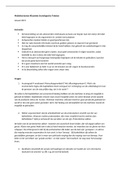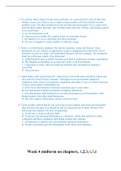Exam (elaborations)
SOCIAL PSYCHOLOGY 11TH EDITION BY SAUL KASSIN, STEVEN FEIN, HOZEL ROSE MARKUS
- Course
- Institution
TEST BANK Social Psychology 11th Edition by Saul Kassin, Steven Fein and Hazel Markus TABLE OF CONTENTS Chapter 1. What Is Social Psychology? Chapter 2. Doing Social Psychology Research. Chapter 3. The Social Self. Chapter 4. Perceiving Persons. Chapter 5. Stereotypes, Prejudice, an...
[Show more]






